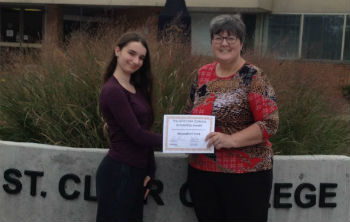By Deron Hamel
Lexi Crowe says she lives her life focusing on looking ahead and not dwelling on things she can’t change, and this outlook is helping her live well while managing her epilepsy.

Lexi, who graduated from high school last year, had her first seizure when she was in Grade 1. While her seizures were at first sporadic, they became more frequent as she got older.
She was diagnosed as having atypical absence seizures, which are characterized by the same symptoms as absence seizures, such as staring, but are atypical in the sense that people with the condition may still be able to respond when spoken to, for instance.
In July 2018, Lexi was diagnosed with dyscognitive and bilateral seizures, which resulted in her sometimes losing consciousness. She came to realize that these seizures were brought on when she overexerted herself, mentally or physically.
Lexi has played a variety of sports, including hockey, soccer, tennis and baseball. She can continue to participate; however, she says she has to always be mindful of how much stress she’s putting on herself.
“(While participating in) these sports, I have to make sure I don’t overheat myself and to drink plenty of water,” Lexi says. “If I don’t, it would probably lead to a seizure.
“I love playing sports, but my health has to come first.”
Lexi says she is now focusing on her future, working hard to manage her epilepsy and looking ahead.
“As long as I can live a happy life and manage my epilepsy, I will be thrilled,” she says.
Lexi is one of the recipients of this year’s Osler Epilepsy Scholarship. The $1,500 scholarship, formerly called the OBCL Epilepsy Scholarship, is being offered to six students this year.
Osler Epilepsy Scholarships are awarded each year to exceptional students who have confronted and overcome remarkable barriers in their academic and personal lives due to their epilepsy.






